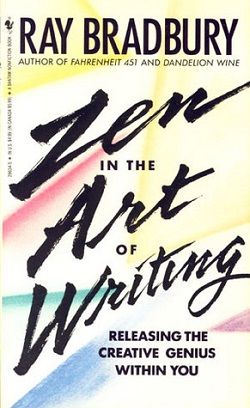Ray Bradbury's Zen in the Art of Writing is not merely a guide for aspiring writers; it is a passionate manifesto that celebrates the creative spirit and the transformative power of the written word. In this collection of essays, Bradbury distills a lifetime of experience into practical advice, philosophical musings, and personal anecdotes that resonate deeply with anyone who has ever felt the call to write.
From the very first page, Bradbury's exuberance is palpable. He opens with a vivid metaphor: “Every morning I jump out of bed and step on a land mine. The land mine is me.” This explosive imagery sets the tone for the book, inviting readers to embrace the chaos and unpredictability of the creative process. Bradbury's writing is infused with a sense of adventure, urging writers to leap into their work with both feet, to explore the depths of their imagination, and to confront the fears and doubts that often accompany the act of creation.
One of the central themes of Zen in the Art of Writing is the importance of *zest, gusto, and curiosity* in the writing process. Bradbury emphasizes that these qualities are not just desirable but essential for anyone who wishes to craft meaningful stories. He encourages writers to cultivate a sense of wonder about the world around them, to draw inspiration from their own lives, and to pursue their passions with relentless enthusiasm. This message is particularly empowering, as it suggests that the key to successful writing lies not in adhering to rigid formulas or conventions, but in embracing one's unique voice and experiences.
Bradbury's insights into the creative process are both practical and profound. He offers a wealth of advice on topics ranging from finding original ideas to developing a distinctive style. For instance, he advocates for the practice of writing every day, regardless of inspiration, as a means of honing one's craft. He also emphasizes the importance of reading widely and deeply, asserting that exposure to diverse voices and genres enriches a writer's own work. This notion aligns with the idea that writing is not an isolated act but rather a conversation with the literary world.
Throughout the book, Bradbury shares anecdotes from his own life, illustrating how his experiences shaped his writing. He recounts his childhood fascination with the fantastical, his early struggles as a writer, and the moments of serendipity that propelled his career forward. These personal stories serve to humanize the author, making his advice feel accessible and relatable. Readers are reminded that even the most celebrated writers face challenges and setbacks, and that perseverance is a crucial component of success.
Another significant aspect of Bradbury's philosophy is the idea that *success as a writer depends on knowing one subject: your own life.* This assertion invites introspection and self-discovery, encouraging writers to delve into their own experiences, emotions, and memories as sources of inspiration. Bradbury's belief in the power of personal narrative resonates with contemporary discussions about authenticity in writing, highlighting the importance of vulnerability and honesty in storytelling.
In addition to its practical advice, Zen in the Art of Writing is a celebration of the act of writing itself. Bradbury's prose is lyrical and evocative, reflecting his deep love for language and storytelling. He writes with a sense of urgency and passion that is infectious, inspiring readers to embrace their own creative journeys. The book is peppered with poetic reflections on the nature of creativity, the joy of discovery, and the profound impact of literature on the human experience.
Comparatively, Bradbury's work can be likened to that of other literary giants who have explored the art of writing, such as Stephen King in On Writing and Anne Lamott in Bird by Bird. While King offers a more pragmatic approach, focusing on the mechanics of writing and the discipline required to succeed, Lamott emphasizes the importance of embracing imperfection and the messy nature of the creative process. Bradbury, however, stands apart with his unique blend of enthusiasm and philosophical depth, creating a work that is both instructive and inspirational.
Ultimately, Zen in the Art of Writing is a timeless treasure for writers and readers alike. It serves as a reminder that writing is not just a craft but a *lifelong adventure*—one that requires courage, curiosity, and a willingness to explore the unknown. Bradbury's words resonate with anyone who has ever felt the urge to create, encouraging them to jump into the fray and embrace the chaos of their own imagination.
In conclusion, Ray Bradbury's Zen in the Art of Writing is a must-read for anyone seeking to understand the heart of the writing process. It is a book that inspires, challenges, and ultimately empowers writers to find their own voices and tell their own stories. As Bradbury himself suggests, the journey of writing is one of self-discovery, and the only way to embark on that journey is to take the leap. So, jump!
























Reviews 0
Post a Reviews: